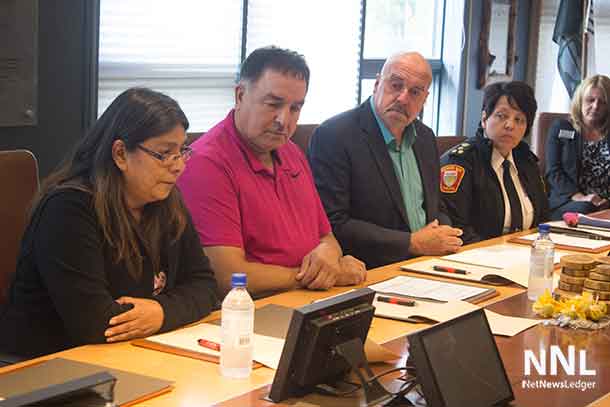FORT WILLIAM FIRST NATION – North Caribou Lake First Nation (NCLFN), Fort William First Nation (FWFN), the City of Thunder Bay (CTB) and the Thunder Bay Police Services (TBPS) signed a Friendship Agreement to promote and co-operate in the areas of community development, public safety, anti-racism, education, social and cultural awareness between all four partners and their citizens.
“By working together and sharing resources, we can remove barriers, seek common ground for a meaningful dialogue, be respectful of disagreements and issues and through listening and teaching each other about our differences we will find solutions,” said Chief Dinah Kanate, who had the original vision for the partnership.
On June 1, under the leadership of Chief Kanate, a community prayer and unity walk in honour of the late Tammy Keeash and late Josiah Begg was organized in Thunder Bay with the overwhelming help and support from the people who joined the walk, CTB, TPBS, FWFN, local organizations, businesses, and volunteers. A grassroots approach called Mamow –WetunKeemTowin’s (Working Together) was also established to continue to work together at a grassroots level to develop and implement solutions.

This Friendship Agreement was a result of the growing relations that originated from the walk. NCLFN, FWFN, COTB, and TBPS are committed to working together through a grassroots approach to bring people together to build bridges, encourage the community to contribute by taking affirmative action with shared responsibility, raise awareness to begin the healing process and implement solutions for reconciliation.
“The more integrated we are the less we will subscribe to the us vs. them attitudes,” added Chief Kanate. “Today, the most pressing priority, that is our collective responsibility, is to prepare First Nation children and youth for their future and create a safe and nurturing environment so they can realize their dreams and full potential.”
Chief Kanate also added that she is grateful for establishing this connection with these partners. Her vision is to tap into the power of working together as a whole instead of individual parts to serve the common purpose of strengthening relations and developing solutions to address common issues affecting all of us.
“We must come together to find solutions to keep youth, and everyone in Thunder Bay, safe,” said Mayor Keith Hobbs. “We must come together to take action. We will do whatever we can, whatever it takes, to heal this community.”
“This is still much work that needs to be done, however today’s ceremony and signing is another positive step in the right direction towards true reconciliation and partnership,” said Chief Peter Collins, Fort William First Nation. “As the Chief of Fort William First Nation on which the traditional territory the City of Thunder Bay is built on, I look forward to working alongside all the signatories and helping to assist to create real positive change and to improve the safety and well-being of all people that call Thunder Bay home.”
In late August, First Nation students as young as thirteen years old moved away from home for their first time. They left their families and homes in remote locations in northwestern Ontario to attend high school in Thunder Bay. Staying home is rarely an option because most communities do not have grade nine available.
For their teenage years, the students are placed in boarding homes and sponsored by their tribal councils who are often hundreds of kilometers away. Any teenager, in any town, even living with family, is at risk for exploitation, neglect, abuse, racism, and violence; add to that the risk factor of being far away from home, in a big busy city, on city buses, with busy streets, attending a new high school and one can see how cumulative risk starts to grow. Some of the tribal councils have worked collaboratively to ensure safety and well-being of their students and working diligently to meet student needs.

